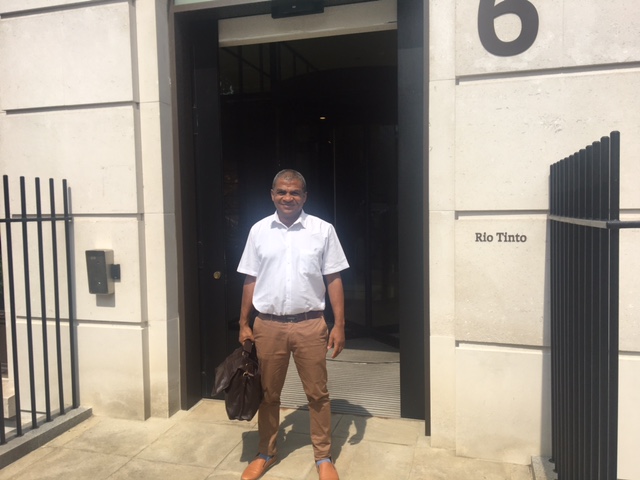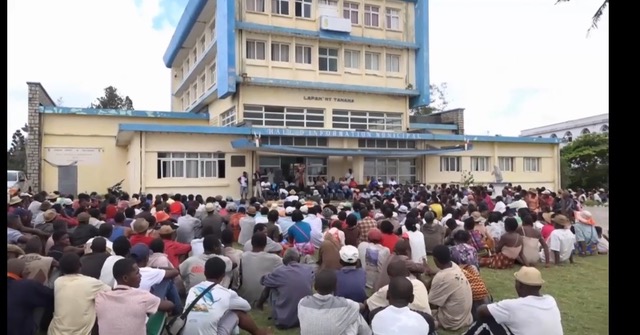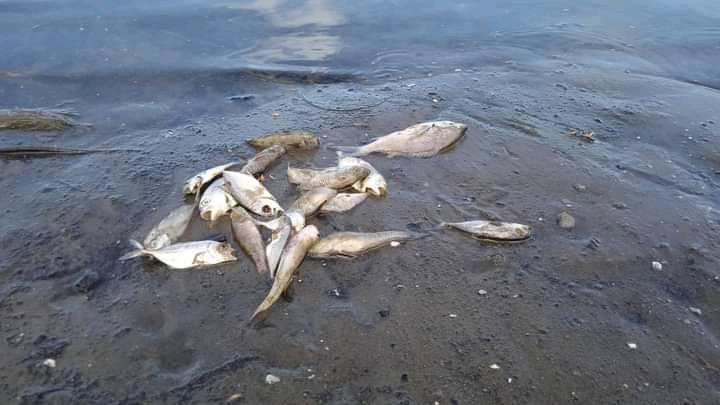
After months of crisis in Anosy following QMM’s mine tailings dam failures and the release of a million cubic metre of QMM mine basin water into the local environment with subsequent fish deaths and fishing ban, Rio Tinto’s CEO agreed to meet and discuss the issues at the London HQ.
Campaign partners Publish What You Pay Madagascar (PWYP MG) and Andrew Lees Trust (ALT UK) attended and, with support provided by London Mining Network, ALT UK also accompanied the Anosy Diaspora representative Tahiry Ratsiambahotra to the meeting to share community concerns directly with the Rio Tinto executive.
The meeting took place on 20th July and provided an opportunity to review pressing matters following the fish deaths and community crisis in Anosy, where thousands of villagers have been negatively affected by the mine, losing lands and livelihoods.
Conflict and complaints
After local protests and road blocks escalated into hostage taking in May 2022, solutions were urgently needed to resolve the crisis. Intervention from Malagasy Government ministers led to the setting up of a local commission with the Governor of Anosy and QMM to respond to complaints and address the rights of villagers to compensation for their losses – not just during the fishing ban but for impacts suffered over more than a decade of QMM operations.
Read the PWYP MG 2022 Report on the impacts of QMM on local communities HERE
By the time of the July meeting, 8778 complaints had been submitted to QMM from villagers, largely about loss of lands and livelihoods as a result of the mine operations. The commission is ongoing and outcomes pending.
QMM admits “the conflict is not over “ (Rio Tinto meeting 20/07/2022)

One major concern is the news that QMM does not intend to pay out monetary compensation to remedy losses, but will only offer work for pay. This is likened to someone smashing up your car only to be told by the person who did it that they will offer you paid work so you can save up to buy a new one….a form of neo-colonial enslavement that we fear will do little to resolve grievances and repair damages.
Demands on Rio Tinto
The compensation matter was raised at the meeting, together with a demand for a national commission on water quality around the QMM mine, as had been pledged by Rio Tinto in 2019 but has yet to materialise.
We continue to lobby for this national water commission and argue that it must be ongoing for the life of the mine, should include international as well as Malagasy technical experts, and ensure robust mechanisms for open engagement and transparent reporting to all concerned stakeholders.
We have also reiterated demands for Rio Tinto to address the need for independent verification processes and an audit of QMM operational matters, including on dam safety and tailing management, as raised at the 2022 Rio Tinto AGM in Australia. And we have urged Rio Tinto’s CEO, Mr Jakob Stausholm, to maximise his personal engagement in the QMM issues to advance meaningful solutions and change.
See : joint letter to CEO Stausholm
Technical issues : water quality and dead fish
Meanwhile Rio Tinto has yet to respond to a number of technical questions raised in June and July via email – including about the current trials for its treatment of elevated aluminium and low pH levels in mine basin water, the combination of which was deemed the most probable cause of the fish deaths by international expert Dr Swanson (April 2022).

In written exchange in June, the company conceded that it “cannot rule out a potential link” between the quality of QMM mine process water and the localised fish deaths ( QMM response to Swanson Memo, June 2022), something it adamantly refused to do publicly during the local fishing ban.
Additionally, it is not clear how this new QMM water treatment process will address other heavy metals of concern, such as uranium and lead, which have been detected in waters downstream of the mine at levels way above the WHO guidelines for safe drinking water.
With Rio Tinto finally responding to our repeated demands for the release of pre-mining water data (Hatch & Associates study, 2001) – data that QMM denied was available – the company will now have to explain the apparent contradiction between its claims that elevated levels of uranium in waters downstream of QMM is “naturally occurring” and the pre-ming data, which demonstrates that this is not the case.
The implications of these new data on the water quality contestations have yet to be addressed by Rio Tinto.
Ongoing challenges
Rio Tinto has made verbal assurances that it will address the social and environmental issues at QMM. More than this, we have asked what steps will be taken, by who and when, in order to make tangible and meaningful changes at QMM to improve its operations and social performance.
As villagers wait for the outcome of the commission and for their losses to be recognised and remedied, we ask what will now shape the evolution of the QMM mine to deliver a different, positive outcome for the people and the environment of Anosy.
Related Blogs:
http://www.andrewleestrust.org/blog/?p=2238 http://www.andrewleestrust.org/blog/?p=2309 http://www.andrewleestrust.org/blog/?p=2671

Pingback: Rejecting injustice, building a better future - London Mining Network